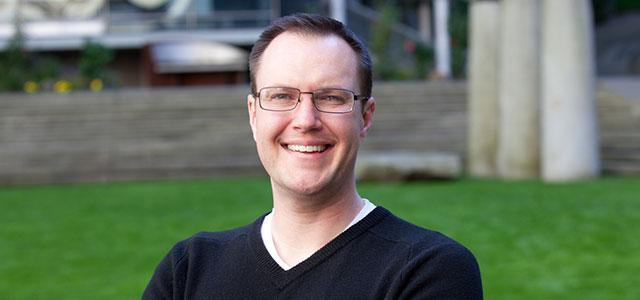
Adam Carrico (photo by Elisabeth Fall)
Zeroing In on HIV
Adam Carrico, a new assistant professor in the UCSF School of Nursing Department of Community Health Systems, has long been fascinated by the complexities of human behavior. That interest has taken his career to the center of America’s HIV/AIDS epidemic, where he researches ways to promote behavior change among a marginalized, underserved population: HIV-positive gay and bisexual men who are also caught up in the “intertwined” epidemic of methamphetamine use.
“In terms of health disparities, these men continue to be heavily impacted by the HIV epidemic,” says Carrico, who has a PhD in clinical-health psychology from the University of Miami. “We know that if we can help this group of people manage their HIV better, we can optimize their health outcomes as well as reduce the rate of onward HIV transmission.”
That’s important, because gay and bisexual men are more severely affected by HIV than any other group in the United States, according to the Centers for Disease Control and Prevention. While men who have sex with men represent approximately 2 percent of the US population, they accounted for 61 percent of new HIV infections in 2009.
The CDC has also raised the alarm about the role that methamphetamine plays in HIV transmission in both gay and heterosexual populations. Studies of men who have sex with men have shown a high prevalence of the use of methamphetamine, cocaine and club drugs such as ecstasy in tandem with risky sex practices.
In these populations, slowing the epidemic often demands lifestyle changes and the cultivation of healthy habits – but that isn’t easy for someone who feels hopeless about himself and life. Carrico points out that gay and bisexual men often face social stigma and family rejection, especially in the African American and Latino communities. An HIV diagnosis on top of those challenges can bring depression, trauma and a sense of fatalism, which can serve as obstacles to reducing methamphetamine use.
Thus, too often these men may start using methamphetamine as a way to boost self-esteem, enhance sexual pleasure and enjoy a sense of euphoria that can last hours, according to a fact sheet on methamphetamine use and HIV jointly prepared by UCSF’s Center for AIDS Prevention Studies and the San Francisco Department of Public Health. The problem is that continued methamphetamine use increases instability in their lives, leads to addiction and pushes them farther to the margins of society. Many men find it overwhelming to give up a drug that exerts such power over their minds and bodies.
“They are the people who are tossed away, the patients that many providers have difficulties working with,” Carrico says.
Interest Began as an Undergrad
Carrico’s interest in HIV prevention and drug use emerged when he was an undergrad studying psychology at Loyola University Chicago.
This was in the late 1990s. In certain ways, it was “a time of liberation in the gay community,” Carrico says. The fear of AIDS as an automatic death sentence lifted somewhat in 1997 when highly active antiretroviral therapy (HAART) became available and was shown to suppress the virus and the progression of AIDS.
But the idea that these new medications could save people from a devastating illness created a situation in which some men convinced themselves they could again take sexual risks. At around that time, methamphetamine and club drugs gained popularity in the gay party scene.
Carrico’s concern about HIV became personal when some friends in their early 20s were diagnosed with the virus. “That was really influential on me,” he says.
Mind and Body
At the University of Miami, Carrico became intrigued by studies that showed how depressed mood is associated with a more rapid progression to AIDS, signified by increased viral loads.
His interest in the “mind-body” relationship between HIV, drug use and psychological states helped fuel early research projects, including a study led by his mentor, Michael Antoni, at the University of Miami that examined the efficacy of a 10-week cognitive behavioral support group with HIV-positive gay and bisexual men. Men who participated were taught a variety of relaxation exercises and techniques for coping with HIV-related stress and the side effects of antiretroviral therapy. Participants reported improvements in psychological adjustment and their ability to cope with their HIV; they also experienced clinically meaningful reductions in viral load.
“The group intervention format offers the opportunity for social support,” Carrico says. “Participants learn a lot from each other and about how to manage their HIV more effectively.”
Drug Use as the Driver
Still, Carrico’s concern about methamphetamine’s role in HIV prevention prompted him to seek out clinical experiences in drug treatment while he was an intern in behavioral medicine at the VA Palo Alto Health Care System.
Carrico stayed in the Bay Area and found his way to UCSF School of Medicine in 2006 for a postdoctoral fellowship in health psychology; Judith Moskowitz and Mallory Johnson served as his mentors. This fellowship allowed him to examine the impact of methamphetamine and other stimulants on HIV disease management and HIV viral load.
Carrico has come to believe that addressing drug use is the key to helping this subset of HIV-positive men manage their diagnosis and develop safer sex practices.
“Even though we try to help them reduce the sexual risk-taking behavior, sometimes we just need to remove the driver, which is the drug use,” he says. “In addressing their drug use, it has downstream effects on sexual behaviors and their engagement in their own HIV care.”
Coming to San Francisco
Carrico, who is also on the faculty at the Center for AIDS Prevention Studies, says, “UCSF is where I always wanted to be. It’s at the cutting edge of research in HIV.”
In addition, San Francisco has given him the opportunity to work closely with the San Francisco AIDS Foundation’s Stonewall Project, which provides counseling, treatment and support services to gay, bisexual and other men who are struggling with drug and alcohol problems.
Carrico has become an advocate for the harm-reduction approaches Stonewall employs, which stand in contrast to other drug treatment programs that stress abstinence. “People come to treatment with various goals,” Carrico says. “We work with them with their stated goals, and then move them through stages of change. I was really excited about the Stonewall model because they are meeting people where they are at and helping them make the changes they are motivated to make.”
He has worked with men who say they have no intention of giving up methamphetamine but are open to talking about moderating their use. In what Carrico calls a less judgmental environment, the men also become receptive to learning about strategies to be safe during sex and managing HIV.
His support of the Stonewall Project extends to participating regularly in the San Francisco AIDS Foundation’s annual fundraiser: the seven-day, 545-mile AIDS/LifeCycle bike ride from San Francisco to Los Angeles. The ride this year is June 2-8.
“While I was doing my postdoctoral work and a lot of research into HIV, I was also trying to figure out how I could contribute in other ways,” says Carrico, a cyclist who goes on training rides every weekend. “It’s also a fun way to build a sense of community in San Francisco.”
Working with Nurses
Carrico joined the School of Nursing in April because of its commitment to social justice and student-centered teaching.
He’s particularly eager to work with students in the psychiatric nurse practitioner program and to train future nurse scientists who can develop evidence-based interventions to promote health and help prevent HIV/AIDS.
He will also continue his various research projects into psychological interventions for stimulant-using gay and bisexual men. One project examines the outcomes of the harm-reduction program offered at the Stonewall Project. Another looks at helping men overcome the trauma caused by living with HIV/AIDS.
As his research has shown, helping HIV-positive men to reduce stress can reduce viral loads, which in turn reduces the likelihood that they will transmit the virus to uninfected sexual partners.
Teaching these men to be kinder to themselves also goes a long way toward helping them develop the positive mental outlooks needed to make changes in their lives, he says. Indeed, one of his most recent projects, a National Institute on Drug Abuse study with Moskowitz at the UCSF Osher Center for Integrative Medicine, will explore this approach.
He says: “The interventions we are testing are about helping individuals focus on the good things that are happening in their lives, to help them actively create opportunities for positive emotions, like gratitude, that help them to cope with stress more effectively.”



